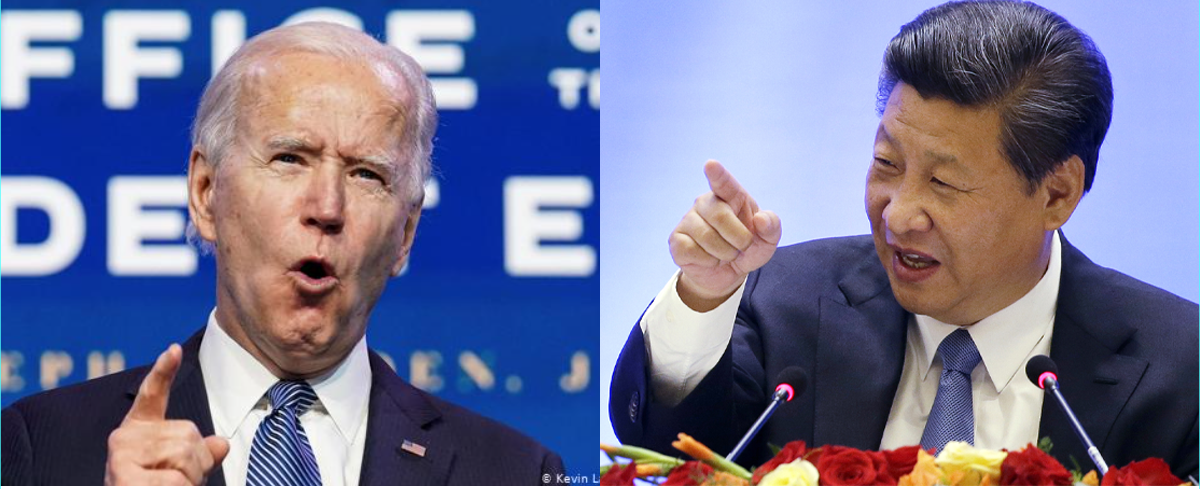By Tunde Animasaun
For more than 30 years, America, after the break-up of the Union of Soviet Socialist Republics (USSR), has remained the lone super power in the world. The American brand reigned supreme in international relations with others queuing behind it until China emerged on the scene as a budding super brand. It is understandable, therefore, if the rising economic power and international influence and affluence of the People’s Republic of China has become a cause of concern for the reigning super power. After all, it is only natural for the alpha male to jealously guard its territory. Add the devastating effect of the Covid-19 pandemic on America, a crisis which Donald Trump, the former American President believed was unleashed by China, the huge American indebtedness to China, the Chinese extensive investment interests in America and China’s growing external influence especially in Africa and the developing world, to the foregoing and you will begin to understand the restlessness in the White House.
China’s rise to prominence was no happenstance. It was a product of brand reengineering, repositioning and promotion. This came about when the former Chinese leader, Deng Xiaoping realized that the Maoist era of strict communism and economic isolation branding has outlived its time. He therefore began the process of modernisation of China starting with what is popularly known as the ‘Four modernisations of China’. The goal was to strengthen the sectors of agriculture, industry, technology and defense.
To make the transformation possible, he embarked on intensive propaganda and promotions to get the people’s buy-in as evinced by the propaganda posters of the 70s and 80s, which promoted the creation of a society of civilised and productive citizens all working toward the welfare of the country and contributing to the modernisation effort.
An important aspect of the modernisation was the re-building of education institutions and the encouragement of study. Propaganda posters that encouraged study were frequently targeted at urban youth, the return of the intellectuals, a group that had frequently been accused of being “bourgeois” under Mao. Workers, peasants, and soldiers, while still portrayed, were no longer the only role models. Intellectuals had been elevated to the status of “mental workers” and were now shown as responsible and productive members of society. That was the beginning of the transformation of the Chinese brand, a branding and marketing effort that succeeded in transforming the China brand into an international icon.
Today, China stands as the exemplar national brand that has witnessed ‘miraculous’ turnaround. The rising equity of that national brand, its popularity and ‘rally-point’ status for countries at the receiving end of America’s super power play is irksome to the ‘big man’ on the block. This seeming challenge and growing equity is therefore causing some unease in the White House.
This unease did not start with Biden’s presidency. When belligerent Donald Trump, the immediate past American president started the anti-Chinese policy, many thought he was just being his characteristic self. Biden’s tough stance has, however, come as a surprise. According to Jonathan Tepperman, a former editor-in-chief of Foreign Policy, most American experts did not expect this strong anti-Chinese stance from President Biden judging from his antecedents as Senator, Vice President and as presidential candidate.
“One of the most interesting things about Biden’s tough stance toward China is how a few experts anticipated it. Just as most analysts expected his domestic policies to be modest – to gently steer the country back to fact-based, civil-minded normalcy – they also predicted that his stance toward China would be similarly mild and pragmatic. Biden has never been a foreign-policy ideologue or a hawk, and as a candidate, he emphasised the need for cooperation between the two states while scoffing at the idea that, unless the United States acted fast, China was going to ‘eat our lunch’.”
“It therefore came as a shock when, soon after taking office, his administration launched an aggressive, full-spectrum face-off with Beijing. What exactly changed Biden’s mind? Why he went from favouring cooperation to confrontation remains unknown. Whatever the answer, though, President Biden clearly views China differently than candidate, or Vice President, or Senator – Biden did,” Tepperman observed.
President Biden’s toughening stance became evident upon assumption of office. According to Tepperman, the man who only two years ago was playing down the threat posed by China pledged in March that on his watch, China would never “become the leading country in the world, the wealthiest country in the world, and the most powerful country in the world.” Also in the same month, Secretary of State Antony Blinken and National Security Advisor Jake Sullivan were in Alaska for the administration’s first high-level meeting with China where the two openly rebuked their Chinese counterparts and accused Beijing of “threatening the rules-based order that maintains global stability.” That same month, in its annual human rights report, the State Department for the first time formally charged China with committing genocide in its Xinjiang region. In May, Kurt Campbell, top China official on the National Security Council declared that the period of “engagement with Beijing has come to an end.”
Moreover, the Biden administration has not missed any opportunity to rally support for its anti-Sino doctrine among its allies. During the G-7 Summit and Quadrilateral Security Dialogue meetings, it pressed its allies to rally around it in the struggle. It is efforts like this that led to the announcement of a developing-world infrastructure investment program meant to rival China’s Belt and Road Initiative, a plan to counter China’s vaccine diplomacy by distributing nearly 2 billion doses of COVID-19 vaccines, and on Monday, to NATO’s denunciation of China’s cybercrimes.
On the economic front, it’s a no-hold barred confrontation. This is perhaps informed by the impact of China’s activities on the American economy especially the Belt and road initiative. Since the USSR, no country’s internal activities have affected America like China. Its actions in manufacturing, technology, trade, or cybersecurity, directly affect millions of Americans. Hence, the aggressiveness with which Biden takes on China economically. Apart from maintaining former President Donald Trump’s trade sanctions against Beijing, he has worked with the Senate to pass a massive, quarter-trillion-dollar industrial policy bill aimed at boosting U.S. competitiveness, launched a ‘Buy American’ campaign that cuts foreign firms out of the extremely lucrative U.S. government procurement market, instituted a blockade of Chinese acquisitions and investments inside the United States and put in place measures to keep Chinese students and researchers out of the country. As recently as last month, Biden signed an executive order banning Americans from investing in Chinese companies linked to the military or to surveillance technology.
President Biden’s foreign policy as it affects China was the focus of the 17 July edition of The Economist. According to the Magazine, toeing the ‘Trumpian bombast’, President Biden and his predecessor have engineered the most dramatic break in American foreign policy.
“Now Joe Biden is converting Trumpian bombast into a doctrine that pits America against China, a struggle between rival political systems which, he says, can have only one winner. Between them, Mr. Trump and Mr. Biden have engineered the most dramatic break in American foreign policy in the five decades since Richard Nixon went to China”.
How has and how will this stance continue to affect America as a brand, its market share in the comity of national brands and its perception by fellow national brands? As the champion of democracy, free trade and globalization, the dramatic recourse to protectionism and economic clampdown smacks of double-speak which can only lead to de-branding and demarketing.
The Economist aligns with this line of thought as it cautions that “Its (Biden’s China Policy) protectionism and its ‘us-or-them’ rhetoric will hurt America and put off allies”.
Interestingly, this is the preponderant perception across the world and surprisingly too, in the home country. In Mongolia, Enkhjin Ganbaatar reacted to The Economist story on the Magazine’s Facebook page thus, “China never wanted to compete with the US, only the US is making an enemy for itself. …US wants a cold war because they are so bored. But the entire world will be against the cold war; literally against the US. Now EU countries should cut the close relationship with the US because it is really aggressive and putting the world in trouble. Similarly, Abu Hassan Mohammad from Malaysia said, “Biden’s new doctrine on China if not managed properly will be a “Self-Inflicted” injury to America’s domestic economy. Much of the doctrine is based on Trump’s previous narratives in order to influence support from the Republicans. The recent at hand is the unpopular moves to increase the corporate income tax which if not properly checked will induce cost-push inflation to the economy. The doctrine is more or less like a ‘Pandora box’”. To Chan Roberts from China, “Biden’s pushing for a new Cold War, this one against China. The US doesn’t like to have its global hegemony challenged”.
From Tokyo, Japan, Coco SuSu is of the opinion that, “The United States now has China in its eyes. It should focus more on its own country, pay more attention to infrastructure, and pay more attention to the poor in the United States. The problem is solved naturally. It is useless to stare at China. China has been developing rapidly. And Yui Lin from the USA advised the US government that, “The enemy is within! It’s time for the US to seriously rebuild infrastructure in every possible area, from child care services, education, health care, social services to affordable housing, public transportation and high speed rail etc. Instead of treating China like an enemy, I truly hope the US could humble and learn from the China success story in building itself! Chinese people are full of hope for the future and patriotic, and no one in China worries about crime and safety. The government takes care of the basic things, values education, and addresses poverty etc. If you asked rural residents about what they thought of the government, people would tell you how the government took care of their daily life’s needs — that’s a good government! I think Biden has a good heart for the people in the US and I wish him well and I’m eager to see real changes in the US under his leadership”.
Some political pundits are however of the view that these diplomatic and economic moves are geared towards countering China’s growing international influence, buttressing America’s standing and resilience, prevent China from taking advantage of U.S. trade policy and stem the tide of Chinese investment incursion into US, as it purportedly has in the past. political consolidation. The calculations, they opined, is to politically insulate the government against Republican attacks, project the American spirit and rally Americans against ‘the common enemy’ thus improving the democrat’s standing before American electorates. In this regard, the policy may be meeting its mark. Fareed Zakaria, the Global Public Square on CNN has indicated that, “60 percent of Americans now have an unfavorable view of the People’s Republic, a record high since the Pew Research Center began asking the question in 2005.”
On the flip side however, the dependence on allies, many of whom are already skeptical, the possible loss of influence on China that the antagonism portends, the possibility of degeneration into armed conflict, either directly or indirectly and the ideological rhetoric of democracy versus totalitarianism, a move which the president himself thinks maybe ‘prosaic’ have the potential of hurting rather than helping the American case.
All these are the resultant effects of the reactionary approach Whitehouse has adopted so far. A well- thought out branding strategy, devoid of self-indulging grandiose but addressing critical deficits in the perception and acceptance of the American brand both at home and abroad (internal and external affairs) is the right way to go. It should be clear to the handlers of the American brand that dominant brands compete not with others but with itself. As a leader, bettering your best is the only way to consistently outplay competitors.







Comment
No comments found.